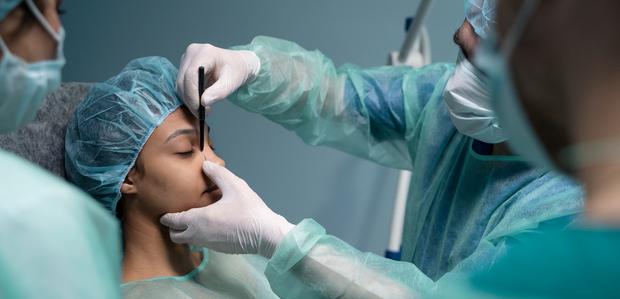Breast Augmentation Bellevue: Enhancing Your Confidence with All-natural Results
Breast Augmentation Bellevue: Enhancing Your Confidence with All-natural Results
Blog Article
A Deep Study the Typical Reason for Looking For Aesthetic Surgery: Unboxing the Need for Modification and Self-Improvement

Social Stress and Beauty Standards
Regularly, societal pressures and prevailing appeal requirements play a considerable role in individuals' decisions to seek cosmetic surgical treatment (liposuction bellevue). In contemporary society, graph greatly influences individual assumptions of attractiveness, typically perpetuated by media, celeb endorsements, and social systems. These networks regularly advertise idealized variations of elegance, leading individuals to internalize these standards and examine their self-regard versus them

Moreover, these pressures are not restricted to specific demographics; they impact individuals across various ages, sexes, and backgrounds, highlighting the pervasive nature of elegance standards. This extensive impact increases important concerns concerning the ethics of cosmetic surgical procedure and the effects of social requirements on individual choices. Eventually, understanding these pressures is vital for cultivating a much more comprehensive definition of beauty that celebrates diversity.
Personal Experiences and Transformative Stories
Lots of people who go through plastic surgery record transformative experiences that extend past plain physical adjustments. For lots of, these procedures serve as a catalyst for enhanced self-esteem and a restored sense of identification. Clients often define feeling liberated from long-lasting insecurities, leading to boosted self-confidence in both personal and professional worlds.
Take, as an example, the tale of a girl who went through boob job after years of feeling awkward about her appearance. Post-surgery, she reported not only a newly found comfort in her body yet also a significant enhancement in her social life and occupation opportunities. Similarly, a middle-aged man that picked to undertake a facelift shared exactly how the treatment rejuvenated his outlook on life, prompting him to seek brand-new passions and partnerships.

Emotional Variables Behind Plastic Surgery
Many psychological variables add to the choice to undergo cosmetic surgery, showing deeper mental and emotional health considerations. Individuals commonly seek medical improvements as a method to attend to feelings of inadequacy, reduced self-worth, or frustration with their look. These emotional motivations can be rooted in past experiences, social contrasts, or personal goals.
Body image distortion is a widespread concern, where people perceive their physical useful content characteristics in an exaggeratedly negative light. This distortion can result in obsessive ideas about regarded flaws, prompting the wish for medical alteration as a solution. Additionally, the pursuit of perfection and societal pressures can intensify these sensations, pressing people towards cosmetic treatments in hopes of attaining an idealized version of themselves.
Furthermore, the concept of self-improvement plays a crucial function. Numerous people view plastic surgery as a path to boost their top quality of life, believing that enhanced look will certainly lead to boosted social acceptance, far better connections, or enhanced occupation opportunities. Ultimately, the emotional aspects behind cosmetic surgical treatment emphasize the intricate interaction between specific self-perception and outside impacts, exposing the diverse nature of the need for adjustment.
The Duty of Media in Perception
In today's society, media plays a critical duty fit understandings of appeal and self-respect. Via numerous platforms-- social media sites, tv, and advertising-- idyllic requirements of beauty are commonly disseminated, influencing private goals and self-image. These representations regularly emphasize narrow interpretations of good looks, mostly including younger, slim, and digitally boosted images, which can produce impractical criteria for individuals striving to conform.
The impact of media is more exacerbated by the prevalent nature of social media, where users are pestered with curated web content that highlights aesthetic enhancements, backing a culture of contrast. This constant direct exposure can result in sensations of insufficiency amongst viewers, prompting them to take into consideration plastic surgery as a way of accomplishing the regarded ideal. Research indicates that individuals who involve with these media depictions are most likely to share discontentment with their appearance, strengthening the wish for surgical treatments.
In addition, the normalization of cosmetic surgical treatment in media stories can desensitize audiences, framing such procedures as commonplace and also essential for social acceptance. Thus, the media's portrayal of appeal not only influences specific choices pertaining to plastic surgery however also adds to a wider societal dialogue concerning self-respect and identity.
Moral Factors To Consider and Future Patterns
Amid the expanding popularity of cosmetic surgical treatment, ethical factors to consider bordering the practice have actually ended up being significantly noticeable. As the demand for treatments climbs, so as well do concerns concerning informed approval, the mental motivations of clients, and the capacity for exploitation by specialists. It is crucial for experts to guarantee that patients fully recognize the benefits and dangers, along with the ramifications of their options, to cultivate a responsible technique to cosmetic improvements.
Furthermore, the impact go to this web-site of social networks and appeal criteria raises concerns regarding the influence on mental health, particularly amongst at risk populaces. As awareness of body image problems expands, ethical practice requires a cautious examination of the inspirations behind medical interventions. Specialists should stabilize person desires with moral obligation, making certain that choices are rooted in real self-improvement instead than social stress.
Seeking to the future, trends might move in the direction of non-invasive and highly progressed treatments, emphasizing person safety and complete satisfaction. Furthermore, site web the unification of emotional assessments might assist address underlying issues before surgical intervention. The cosmetic surgical treatment field should adapt to these moral obstacles while advertising a culture of transparency and self-acceptance, ultimately prioritizing the wellness of clients.
Conclusion
In conclusion, the quest of cosmetic surgical treatment is influenced by a confluence of societal pressures, individual experiences, and emotional aspects. As moral factors to consider advance, future patterns in cosmetic surgical treatment will likely show continuous societal discussions surrounding self-improvement and individual identity.
Often, societal stress and dominating appeal requirements play a considerable duty in people' choices to pursue cosmetic surgical treatment. liposuction bellevue. Ultimately, these transformative stories highlight the complex factors people seek cosmetic surgical treatment, intertwining personal development with the search of aesthetic enhancement
Numerous individuals watch cosmetic surgery as a path to improve their top quality of life, thinking that boosted look will certainly lead to raised social acceptance, much better connections, or improved job possibilities. Inevitably, the psychological factors behind cosmetic surgical treatment highlight the complex interplay in between private self-perception and outside influences, disclosing the diverse nature of the wish for modification.
As ethical considerations advance, future patterns in cosmetic surgery will likely reflect ongoing societal dialogues bordering self-improvement and private identity. liposuction bellevue.
Report this page